IUFRO 125th Anniversary Congress Spotlight #47 – Remote forest-dependent communities can benefit through social innovation
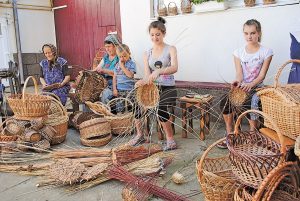
The village of Iza in Transcarpathian Ukraine is famous far beyond the region’s borders for its wicker products. Most villagers are involved in the business.
http://ukurier.gov.ua/uk/articles/selo-iza-na-zakarpatti-postachaye-virobi-z-verbi-d/
Many rural forest-dependent communities face similar challenges – lack of infrastructure, housing, and transport as well as aging populations.
When global issues such as climate change, sustainability, and energy and food security are added to the mix, the need for solutions to the challenges becomes much more pressing. Read more…
Forests and the bioeconomy: challenges and opportunities
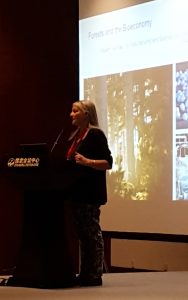
Elspeth MacRae delivering her keynote speech. Photo: Gerda Wolfrum, IUFRO Headquarters
Keynote speech by Elspeth MacRae, Scion, New Zealand
Read an interview with Dr. MacRae at: https://blog.iufro.org/2016/09/01/interview-with-dr-elspeth-macrae-scion-new-zealand/
Find biographic information at: http://www.iufro.org/events/congresses-regional/#c25751
The future holds tremendous challenges for the world with the increase in population probably being the largest one. As a consequence, we expect a need for a 70% increase in the amount of food available by 2050. The demographic changes and new lifestyles will put a growing pressure on the natural resources, exacerbate the effects of climate change, deplete soils and make water a scarce commodity, among other things. Read more…
Agroforestry – Tradition and Innovation
Session B-05 (26): Approaches for Sustaining Agroforestry Systems and Practice in Asia and Oceania
Moderator: Swoyambhu Man Amatya, Coordinator IUFRO Division 1.04.00, Ministry of Forests and Soil Conservation, Nepal
Wednesday, 26th of October 2016, 10:30-12:30 (301 B)
Find more information on the IUFRO Division 1.04.00 Agroforestry at:
http://www.iufro.org/science/divisions/division-1/10000/10400/
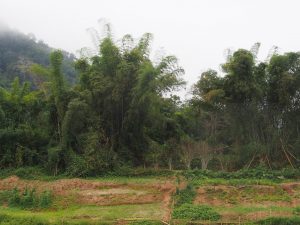
Agroforestry area in Laos. Photo: Renate Prüller, IUFRO Headquarters
While undernourishment decreased globally, agriculture has intensified. Agroforestry systems are believed to reduce negative impacts of farming, by enhancing ecosystem services without hindering the yield of farmers. This session explored agroforestry systems currently used in Asia and Oceania as well as the potential role of agroforestry in securing food, livelihoods and mitigation of climate change effects. Read more…
Addressing the challenge of increasing dryland areas
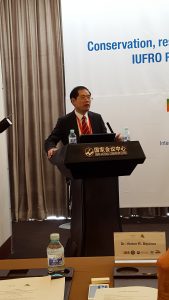
Lu Wen Ming delivering welcome remarks at the dryland session. Photo: Gerda Wolfrum, IUFRO Headquarters
Session A-05(108): Conservation, restoration and sustainable use of dryland ecosystems
There is clear evidence of the fact that the growth rate of CO2 concentration has been increasing and, together with other greenhouse gases, this increase is a main driver of global warming. Unfortunately, these gases have a relatively long lifetime – CO2, for example, has a lifetime of 200-400 years – which means that we are putting a heavy burden on future generations.
Desertification is one of the results of rising temperatures. In China there are actually 4.52 million km2 of drylands constituting 47.1% of the total landmass. Parts of these dryland areas are threatened by degradation and desertification. In Mongolia we are witnessing a marked decrease of the number and area of lakes. This is mainly due to human activities such as coal extraction and irrigation. These and other anthropogenic drivers of change in drylands intensify the pressure on land, which leads to land degradation and decreases the ecosystem value, thus affecting people’s livelihoods. Read more…
Biomass – Capturing the Potential
Session title: Sustainable biomass for Asia’s growing bioeconomy: regional initiatives and promising examples
Moderator: Viktor J. Bruckman (Austrian Academy of Sciences, Austria; coordinator IUFRO TF “SFBN”)
Monday, 24 October 2016, 16:00-180:00 (302 A)
Find more information on the IUFRO Task Force, Sustainable Forest Biomass Network, at:
http://www.iufro.org/science/task-forces/forest-biomass/
In this session the speakers gave examples of concepts and cases for the sustainable development of biomass in Asia and Oceania. The variety of topics and local conditions highlighted the diversity of research required to provide a sound scientific basis to guide policy that supports innovation and protects forest land from degradation, over-exploitation, and subsequent negative impacts on ecosystem services. Read more…
Forest Environment under Changing Climates and Societies
Opening of the first ever IUFRO All Division 8 “Forest Environment” Conference on 23 October, 2016, in connection with the IUFRO Regional Congress for Asia and Oceania in Beijing, China
In his inaugural statement IUFRO Division 8 Coordinator Jean-Michel Carnus highlighted the complete alignment of IUFRO Division 8’s thematic focus with the Regional IUFRO-AO 2016 Congress theme of “Forest Environment under changing climates and societies“.
Recognizing that the participants were the most important ingredients of a successful Congress, IUFRO Vice-President Björn Hånell proudly acknowledged the 20 sessions and 100 presentations of Division 8 that had been fully integrated into the Congress program. He pointed out that the need for knowledge on forest environment had never before been so urgent. And, since such a broad field cannot be mastered alone, scientific cooperation and networking are of utmost importance. Read more…
Interview with Professor Zhang Shougong, Chinese Academy of Forestry (CAF)

Professor Zhang Shougong, Chinese Academy of Forestry (CAF)
Keynote speaker at the IUFRO Regional Congress for Asia and Oceania –
Forests for Sustainable Development: The Role of Research
Professor Zhang, the IUFRO Regional Congress for Asia and Oceania 2016 is jointly organized by IUFRO and the Chinese Academy of Forestry. This is the first Congress of its kind to be held in the region of Asia and Oceania and will offer an extraordinary opportunity for enhancing forest science cooperation. You are one of the leading scientists in silviculture and forest management in China and have a long experience in the establishment of planted forests on the one hand, and sustainable forest management on the other hand. The Congress will particularly focus on these two areas with its themes “Planted forests for fostering a greener economy”, and “Sustainable forest management for enhanced provision of ecosystem services”. Read more…
IUFRO Spotlight #37 – Conserving Biodiversity While Managing Tropical Forests
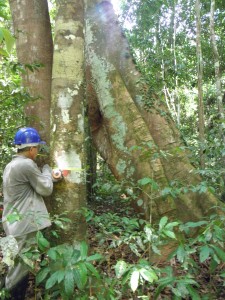
Measurement of tree dimensions in permanent sample plot in the Tapajós National Forest, Brazil. Photo: Angela Luciana de Avila
Managed forests are important landscape components in tropical regions. But an understanding of the response of the forests’ biodiversity to silvicultural interventions has been limited.
Finding out more about how that biodiversity responds was a fundamental question behind the research leading to the publication of Medium-term dynamics of tree species composition in response to silvicultural intervention intensities in a tropical rain forest. Read more…
Spotlight #32 – Sharing Knowledge to Rebuild Tropical Forests and Landscapes
Sharing Knowledge to Rebuild Tropical Forests and Landscapes
Tropical forests contain a huge amount of biological diversity, play a key role in human health, offer a vast array of ecosystem services and have become central to global debates on climate change.
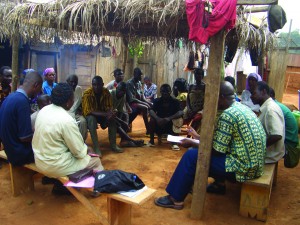 But extensive deforestation and degradation are causing a significant decline in the biological diversity and the ecosystem goods and services provided by them. And, in many African countries there is a notable connection between degradation and the inability of decision makers – and the larger society – to access existing scientific knowledge and innovations that could help reverse the impacts of forest degradation. Read more…
But extensive deforestation and degradation are causing a significant decline in the biological diversity and the ecosystem goods and services provided by them. And, in many African countries there is a notable connection between degradation and the inability of decision makers – and the larger society – to access existing scientific knowledge and innovations that could help reverse the impacts of forest degradation. Read more…
Congress Spotlight #22 – Green cities: The benefits of the urban forest
Green cities: The benefits of the urban forest
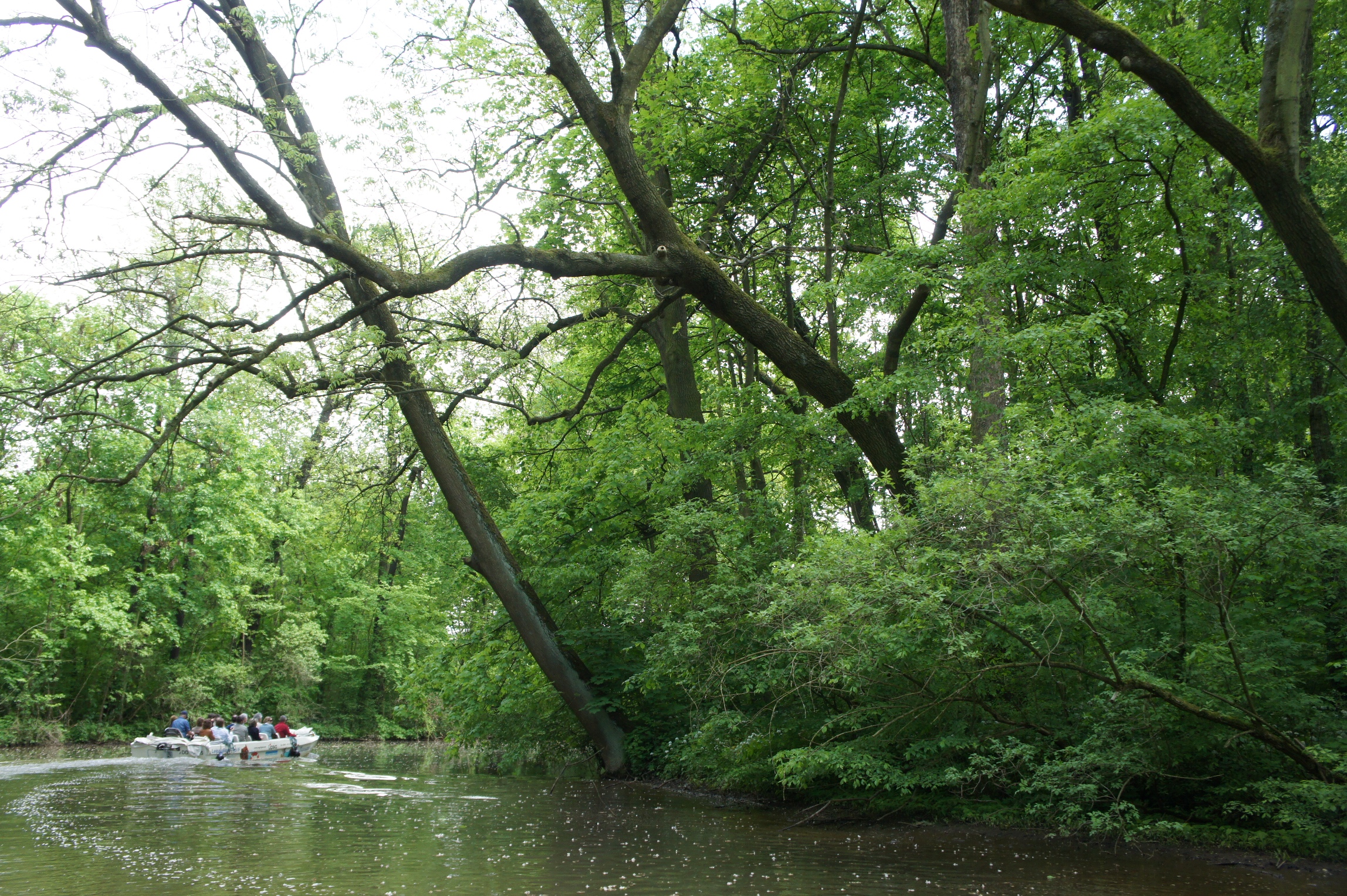
Experiencing the floodplain forests of the city of Leipzig, Germany, from the river (photo by Matilda Annerstedt)
The urban forest means different things to different people.
Many of us see only visually pleasing tree-lined streets, or enjoy the coolness afforded by shade trees on hot days.
Those more closely involved with the urban forest see that – and much, much more.
They also see the urban forest in terms of the ecosystem services and values derived from it – reduced energy use of buildings, improved air quality, stream flows, water quality, urban wildlife, human health, climate change (in terms of both mitigation and species composition) and other benefits that are environmental, social and economic.
